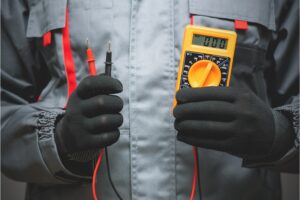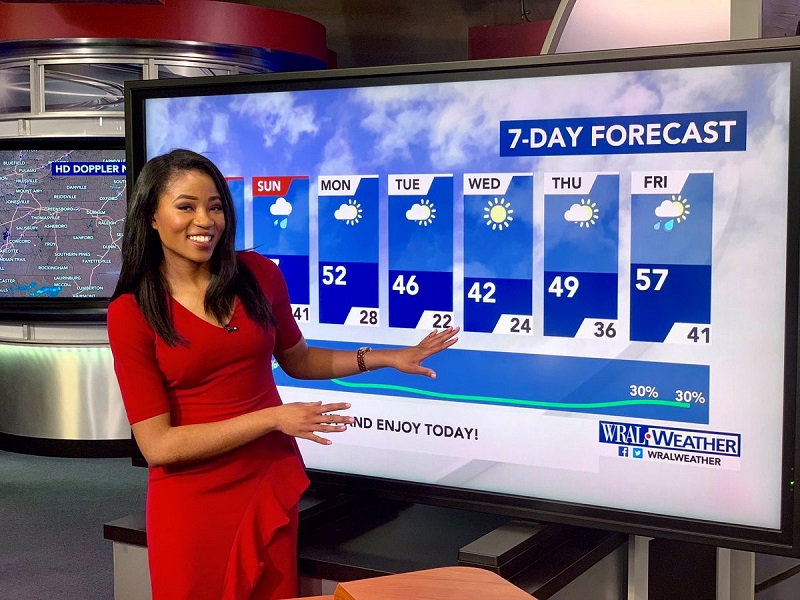
Becoming an Electrician: What are the Opportunities?
Can you think of a place where you go that would not need an electrician? Electricity is an important energy source and a critical element

We all love cool winds in summer and lovely rains in dry weather. But sometimes, Mother Nature can take the wildest route and transform beautiful weather into extreme ones.
We have all witnessed torrential rainfalls, sandstorms, hurricanes, tornadoes, and whatnot. Such atmospheric conditions make everyday things difficult and even cause life-threatening risks.
But what if you could understand the causes of such weathers, predict their time and intensity, and alert the public. If this sounds interesting, you should definitely try becoming a meteorologist.
Not sure where to start? Let’s tell you what meteorologists actually do and show you the pathway to becoming a meteorologist.
What is Meteorology, and what do Meteorologists do?
Meteorology is the branch of the atmospheric sciences that concentrates on winds, airspace, and clouds, with a major focus on weather forecasting.
Meteorologists are scientists that closely monitor the skies and the weather. Moreover, they analyze changes and patterns in weather conditions and forward the necessary information to relevant departments for public announcement.
Additionally, they are also familiar with the mechanics of different weather events and understand the seasonal and geographic factors that might affect precipitation levels and temperatures.
So, how do you become a meteorologist? Here’s how:
Pathway to Becoming a Meteorologist
Let’s dive straight into the step-by-step action plan of becoming an meteorologist in the United States.
Making sure that you are willing to fully commit to pursuing a particular career is the first and fundamental step towards choosing a career. You would never want to waste your time doing something you don’t really like.
Plus, this would also help you take the route towards your final destination rather early in your career.
So, if you plan to become a meteorologist, try to take all the science-related courses and develop a good understanding of subjects like mathematics, chemistry, and physics.
However, if you desire to become just a television anchor reporting on the weather, you’d want to improve your communication and get a bachelor’s degree in journalism or mass communication.
Besides excellent proficiency and understanding of science subjects at a basic level, aspiring meteorologists must complete a Bachelor of Science degree in meteorology or atmospheric sciences.
Some aspirants also pursue a master’s degree and go on to complete doctorates in specific meteorology and climatic subjects.
However, it is always beneficial to have some goals regarding where you’d like to work and do some research on their employment requirements. In addition, some government or even private institutions have very strict requirements, and hence early preparation would help you get through them easily.
Technology and advanced computer skills are pertinent to becoming an expert, professional meteorologist. You are likely to deal with large databases, computer devices, and modern software for measuring and analyzing weather conditions.
Therefore, having advanced technology proficiency is necessary for succeeding in meteorology.
Taking an internship is always recommended regardless of your career stage.
No matter what career path or field you are in, prior experience provides useful information and equips you with vital career advancement skills. Moreover, it gives you a chance to make useful connections that could lead to a job.
Your university or grad school’s placement departments always help you secure internships.
Once you have completed the above steps, start building your social profiles on professional websites like LinkedIn and Indeed, and also make a professional resume.
Include your most recent education, skills, and internship experience in your resume. You can also tailor catchy yet professional cover letters to the jobs and use relevant keywords from their job descriptions.
Then, start actively applying for jobs and find your way into the industry.
However, besides the above-listed education and skill requirements, one can also go for additional certifications. For example, the American Meteorological Society provides certificates in different meteorology areas like teaching, broadcasting, research, and consulting.
The certifications surely boost one’s chances of employment.
Job Description & Duties
Meteorologists are employed at the following places:
In terms of job roles and duties, let’s look at a few things that you’d be doing as a meteorologist.
What type of meteorologists are there?
Despite the above-listed duties, meteorologists work in different capacities and take up various roles such as:
Career Outlook and Salary
Meteorologists earn a handsome amount of money. The average meteorologist makes around $90,000 per year.
Moreover, it’s a profession that is not dying anytime soon. According to the Bureau of Labor Statistics, employment of meteorologists and atmospheric scientists is expected to grow 8 percent from 2020 to 2030, about as fast as the average for all occupations.
This means about 1,000 openings for meteorologists are projected each year, on average, over the decade. Many of those openings are expected to result from the need to replace workers who transfer to a different career path or retire and exit the labor force.
So, if you have a penchant for researching the weather and dealing with loads of data, there is a huge potential in meteorology.
Click link to learn more about internship through the World Meteorological Organization (WMO)
https://public.wmo.int/en/about-us
Click link to learn more about scholarship through the Association of Certified Meteorologists (ACM)
http://certifiedmeteorologists.org/about-association-certified-meteorologists.htm
Explore more careers listed below

Can you think of a place where you go that would not need an electrician? Electricity is an important energy source and a critical element

If you wish to become a security analyst, you can rest assured that it’s an excellent and prolific career choice. However, the process will indeed

In our culture a firefighter is termed “an unsung hero” of our society, and the responsibilities stretch far beyond the understanding of a layman. While

Since regular dental care is important for our overall health, we should find the time to visit a dentist at least to get our yearly

Learning a trade or skill and then mastering it can be quite a lucrative career path, and the same goes for plumbing. If you enjoy

Accounting is an essential field – so much so that a business can’t survive without it. Whether you work as an independent self-employed individual or

Introduction You’ve probably read a few books in your lifetime. But have you ever read a book that changed your life? That’s what Mildred D.

So you’re interested in becoming a podiatrist? That’s great! Podiatry is a fascinating and multifaceted field that can lead to a rewarding career. But before

If you’re not familiar with Sharon Flake, she’s a prolific author of young adult literature. Her books explore tough issues facing teenagers, from racism and

Hi, art lover! We wanted to introduce you to Shane W Evans, an extremely popular illustrator, and author. Evans was born in Columbus, Ohio, in